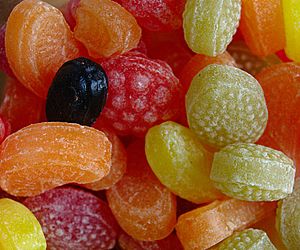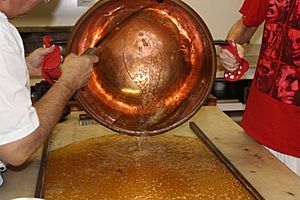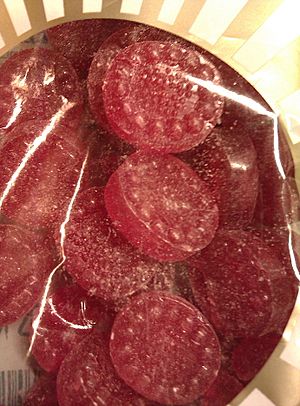Hard candy facts for kids
 |
|
| Alternative names | Boiled sweet |
|---|---|
| Type | Confectionery |
| Main ingredients | Sugar syrup (sucrose, glucose, or fructose) |
| Variations | Many such as candy cane or lollipop |
A hard candy (called a boiled sweet in British English) is a type of sugar candy. It's made from sugar syrup that is heated to a very high temperature, about 160 °C (320 °F). This heating process makes the candy hard and brittle when it cools down.
You'll find many kinds of hard candies. Some popular ones include stick candy like the candy cane, lollipops, and rock candy. Even though they are sometimes called "boiled sweets," the sugar actually melts, it doesn't boil.
Most hard candies are almost entirely sugar. They have very little water. A tiny bit of other ingredients is added for color or flavor. These candies can be made using different types of sugar syrups, like sucrose, glucose, or fructose. There are also versions made without sugar.
Contents
How Hard Candy Is Made
To make hard candy, candy makers start with a sugar syrup. This syrup can be made from sugars like sucrose, glucose, or fructose. They heat the syrup to a specific high temperature.
Once the syrup reaches the right heat, it's taken off the stove. Then, ingredients like citric acid, food dye, and flavorings are added. These flavorings might come from plant extracts or essential oils.
The hot syrup becomes very thick. It can then be poured into a mold or a special cooling table. As the syrup cools, it gets stiff and brittle. This is why it's called "hard candy." When it's cool enough, it can be shaped into different forms.
The Science Behind Hard Candy
Hard candies are special because of their structure. They are known as "amorphous" candies. This means their sugar molecules are not arranged in a neat, organized pattern like a crystal. Instead, they have a disorganized structure.
This disorganized structure is what makes hard candies so stiff and brittle. They contain about 98% or more solid sugar. This high sugar content and lack of organized crystals give them their unique hard texture.
Hard Candy for Health
Hard candies have a long history of being used like cough drops. Their ability to slowly release flavor was very useful. Long ago, pharmacists would use sugar candy to make medicines taste better for their patients.
People with hypoglycemia (low blood sugar) also carry hard candies. Eating them can quickly raise their blood sugar levels. This is important because very low blood sugar can lead to fainting. Hard candies are also used as part of managing diabetes.
Sugar-Free Options
Today, you can find hard candies and throat lozenges made without sugar. These versions use isomalt as a sugar substitute. They are made even sweeter by adding artificial sweeteners. Some common artificial sweeteners include aspartame, sucralose, saccharin, or a sugar alcohol like xylitol.
sv:Karamell
 | Ernest Everett Just |
 | Mary Jackson |
 | Emmett Chappelle |
 | Marie Maynard Daly |



